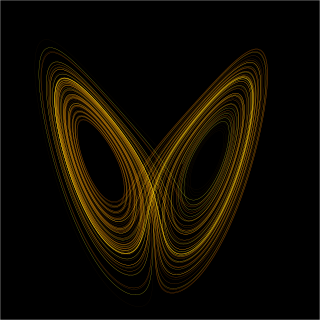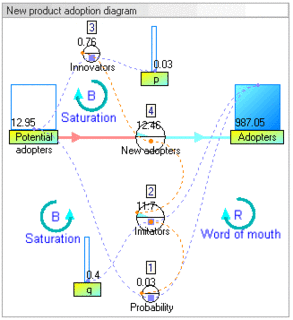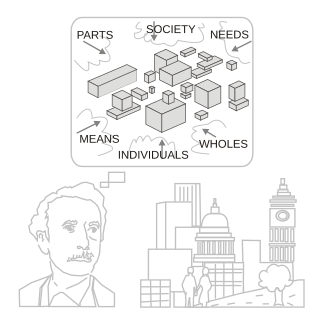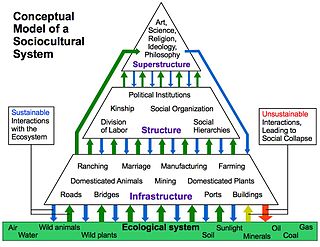 W
WChaos theory is a branch of mathematics focusing on the study of chaos — dynamical systems whose apparently random states of disorder and irregularities are actually governed by underlying patterns and deterministic laws that are highly sensitive to initial conditions. Chaos theory is an interdisciplinary theory stating that, within the apparent randomness of chaotic complex systems, there are underlying patterns, interconnectedness, constant feedback loops, repetition, self-similarity, fractals, and self-organization. The butterfly effect, an underlying principle of chaos, describes how a small change in one state of a deterministic nonlinear system can result in large differences in a later state. A metaphor for this behavior is that a butterfly flapping its wings in Texas can cause a hurricane in China.
 W
WComplex systems biology (CSB) is a branch or subfield of mathematical and theoretical biology invented by Robert Rosen concerned with complexity of both structure and function in biological organisms, as well as the emergence and evolution of organisms and species, with emphasis being placed on the interconnectivity of, and within, biological network inference, and on modelling the fundamental relations inherent to life.
 W
WComputational sociology is a branch of sociology that uses computationally intensive methods to analyze and model social phenomena. Using computer simulations, artificial intelligence, complex statistical methods, and analytic approaches like social network analysis, computational sociology develops and tests theories of complex social processes through bottom-up modeling of social interactions.
 W
WDynamical systems theory is an area of mathematics used to describe the behavior of complex dynamical systems, usually by employing differential equations or difference equations. When differential equations are employed, the theory is called continuous dynamical systems. From a physical point of view, continuous dynamical systems is a generalization of classical mechanics, a generalization where the equations of motion are postulated directly and are not constrained to be Euler–Lagrange equations of a least action principle. When difference equations are employed, the theory is called discrete dynamical systems. When the time variable runs over a set that is discrete over some intervals and continuous over other intervals or is any arbitrary time-set such as a Cantor set, one gets dynamic equations on time scales. Some situations may also be modeled by mixed operators, such as differential-difference equations.
 W
WSystem dynamics (SD) is an approach to understanding the nonlinear behaviour of complex systems over time using stocks, flows, internal feedback loops, table functions and time delays.
 W
WIn philosophy, systems theory, science, and art, emergence occurs when an entity is observed to have properties its parts do not have on their own, properties or behaviors which emerge only when the parts interact in a wider whole.
 W
WGlobal change refers to planetary-scale changes in the Earth system. The system consists of the land, oceans, atmosphere, polar regions, life, the planet's natural cycles and deep Earth processes. These constituent parts influence one another. The Earth system now includes human society, so global change also refers to large-scale changes in society and the subsequent effects on the environment.
 W
WThe Growth and Underinvestment Archetype is one of the common system archetype patterns defined as part of the system dynamics discipline.
 W
WIrreducible complexity (IC) is the argument that certain biological systems cannot have evolved by successive small modifications to pre-existing functional systems through natural selection, because no less complex system would function. Irreducible complexity has become central to the creationist concept of intelligent design, but the scientific community, which regards intelligent design as pseudoscience, rejects the concept of irreducible complexity. Irreducible complexity is one of two main arguments used by intelligent-design proponents, alongside specified complexity.
A New Kind of Science is a book by Stephen Wolfram, published by his company Wolfram Research under the imprint Wolfram Media in 2002. It contains an empirical and systematic study of computational systems such as cellular automata. Wolfram calls these systems simple programs and argues that the scientific philosophy and methods appropriate for the study of simple programs are relevant to other fields of science.
 W
WDavid John Orrell is a Canadian writer and mathematician. He received his doctorate in mathematics from the University of Oxford. His work in the prediction of complex systems such as the weather, genetics and the economy has been featured in New Scientist, the Financial Times, Adbusters, BBC Radio, Russia-1, and CBC TV. He now conducts research and writes in the areas of systems biology and economics, and runs a mathematical consultancy Systems Forecasting. He is the son of theatre historian and English professor John Orrell.
 W
WSystems science is an interdisciplinary field that studies the nature of systems—from simple to complex—in nature, society, cognition, engineering, technology and science itself. To systems scientists, the world can be understood as a system of systems. The field aims to develop interdisciplinary foundations that are applicable in a variety of areas, such as psychology, biology, medicine, communication, business management, technology, computer science, engineering, and social sciences.
 W
WA social network is a social structure made up of a set of social actors, sets of dyadic ties, and other social interactions between actors. The social network perspective provides a set of methods for analyzing the structure of whole social entities as well as a variety of theories explaining the patterns observed in these structures. The study of these structures uses social network analysis to identify local and global patterns, locate influential entities, and examine network dynamics.
 W
WA sociocultural system is a "human population viewed (1) in its ecological context and (2) as one of the many subsystems of a larger ecological system".
 W
WIn the social sciences, unintended consequences are outcomes of a purposeful action that are not intended or foreseen. The term was popularised in the twentieth century by American sociologist Robert K. Merton.